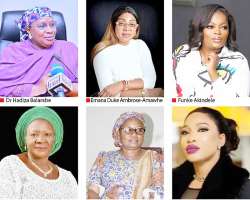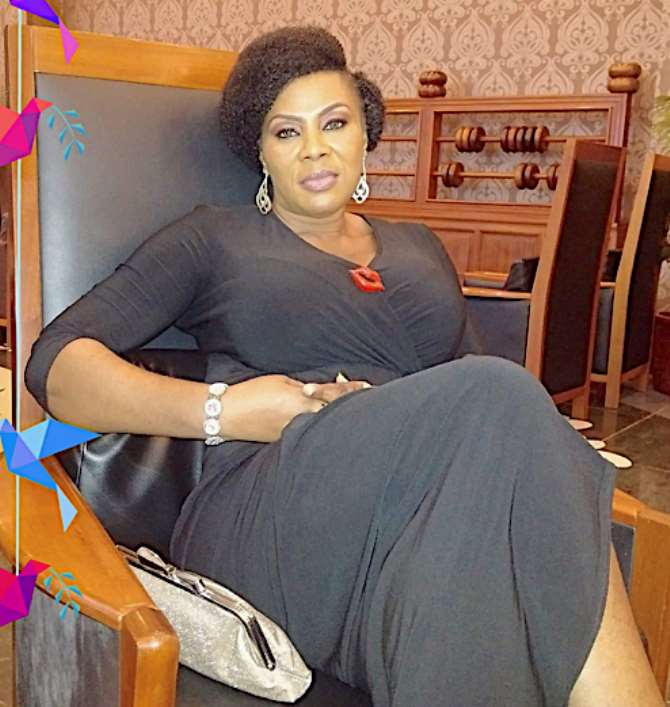Eureka! As Women See 'Light At The End Of The Tunnel' To Government Houses Come 2023

There is no denying the fact that right from the moment Kamala Harris emerged as the Vice President-elect of the United States of America, before her official inauguration, thus making her the first female Vice President in American history, and also the first Black Vice President and the first person of Indian descent to hold the office that not few motivational speakers were seen speaking and writing in their characteristic manners that she has spurred Nigerian top female politicians to eye the presidency ahead of the 2023 general elections.
In as much as this contextual view is not in any way being expressed to mischievously denigrate motivational speakers who no doubt has God-given predilection to deliver speeches with the intention of motivating or inspiring their audiences, and by that encourage them to look at things from a different perspective, and motivate them to take positive action in their lives, it is expedient to say that the underrepresentation of Nigerian women in politics and factors that constrain their participation have become what only God understands, and are core concerns for many Nigerians.
The foregoing pessimistic view cannot be pooh-poohed when analyzed from the prism of the fact that in Africa, some female politicians have been presidents of their respective countries. First among them was Slyvie Kiningi of Burundi, who served as the acting president of the country when President Melchior Ndadaye was shot, together with six of his officials.
Others were Ivy Matsepe-Cassaburi, who served as acting president of South Africa; Ellen Johnson Sirleaf, who served as president of Liberia; Rose Francine Rogombe, who served as interim president of Gabon; Agnes Monique Ohsan Bellepeau, who was the fourth vice president of Mauritius, Joyce Hilda Banda, who was the president of Malawi; Catherine Samba, who acted as president of the Central African Republic; Ameenah Gurib-Fakim, who served as president of Mauritius, and Sahle-Work Zewde, who is the current president of Ethiopia since 2018, being the first woman to hold the office. Most interesting in the foregoing list is Mauritius that has produced both female president and female vice-president.
In fact, given the rate at which women in other climes are shattering glass ceilings in the realm of politics, it may not be wrong to opine, as already expressed in the foregoing that the seeming intractable challenge of political exclusivity being faced by Nigerian women is only within the ken of God almighty. Dispassionately analyzing the situation without being gender biased, it is glaring that it is swiftly spurring a hardening of exclusionary political structures, particularly as it is not providing a platform for women to articulate their experiences in a society where politics is masculinized and women’s subordination to male authority is considered a virtue.
It would be recalled that in past political electoral dispensations that only few women, including Sarah Jibril, Remi Sonaiya and Oby Ezekwesili had vied for the presidency. However, their efforts were fruitless as they were defeated at the polls. Besides, looking at the situation from another perspective, it is not an exaggeration to say that there are few women in political and leadership spaces in Nigeria. Currently only seven out of 109 senators and 22 of the 360 House of Representatives members are women. As it seems, reasons behind the retrogressive circumstances have arguably defied solutions that have been proffered by political scientists and gender specialists by each political dispensation as they have been unable to explain why women lack fair and equitable representation in politics.
Not only has the situation defied experts’ approach to nip it in the bud, the situation on ground, particularly when prognosticated from the backdrop of the ongoing electoral activities ahead of the 2023 election, signs that history will still repeat itself is unarguably obvious, and it cannot be disputed. The reason for the foregoing cannot be farfetched as there is no female presidential nominee that will fly the flag of any of the 18 political parties while it is ignoble and sad that Ojei Princess is the only female vice presidential nominee to contest in the presidential election come February 25, 2023. She will be contesting the election on the platform of the Allied Peoples Movement (APM).
However, it is not an exaggeration to say that ahead of the 2023 general election that there is an impressive improvement at the gubernatorial level where women are unprecedentedly nominated at various party conventions for the positions of Governors and Deputy Governors.
In Northern states there are three female governorship candidates, while the South boast of seven.
For instance, Aishatu Dahiru Ahmed (Binani) emerged the governorship candidate of APC in Adamawa State, while Nnenna Lancaster-Okoro is the governorship candidate of the Peoples Redemption Party (PRP) and Hon NgoziOgbuleke is the governorship candidate of Social Democratic Party (SDP) in Abia State. Obiang Marikane Stanley is the Action Democratic Party (ADP) governorship candidate in Cross River State.
In Rivers State, there are two female governorship candidates, namely Comrade Beatrice Itubo of LabourParty (LP) and Sophia Cookey of Zenith Labour Party (ZLP). In a similar vein, still in Rivers State, a former commissioner for Education, Prof Ngozi Odu is the deputy governorship candidate of the PDP, while Tonto Dikeh, a Nollywood actress, is the deputy governorship candidate of the African Democratic Congress (ADC).
Similarly, Princess Tambari Hilda Dedam is the deputy governorship candidate of the Accord Party (AP) in Rivers State.
Niger State also has two female governorship candidates, Tina Barde of Labour Party and Khadijat Abdullahi Iya of APGA. In Ogun State, the female governorship and their political parties are Chief (Dr) Kasim Jackie-Adunni of NNPP and Iskil-Ogunyomi Sufiat Olajogun Adekemi of AA.
For the running mate position, while the North has six, the South has 18. In Lagos State, the PDP governorship candidate In Lagos State, Dr. Olajide Adediran, unveiled Nollywood actress, Funke Akindele as his running mate for the 2023 governorship election in the state.
In Kaduna, the APC governorship candidate in the state, Sen Uba Sani, chose the incumbent deputy governor, Dr. Hadiza Balarabe, as his running mate in the 2023 polls.
In Ogun State, two political parties fielded women as deputy governorship candidates in the forthcoming election.
While the incumbent deputy governor, Engineer Noimot Salako-Oyedele is still paired with her principal, Prince Dapo Abiodun, on the platform of the APC, the LabourParty (LP) has elected Dr Aishat Lawal-Keshinro to pair with its gubernatorial candidate, Kehinde Shogunle, in the election.
In Plateau, the PDP gubernatorial candidate in the state, Caleb Mutfwang, picked Josephine Chundung Piyo as his running mate. Mrs Emana Ambrose Amahwe is the running mate to Cross River State PDP governorship candidate, Senator Prof Sandy Ojang Onor.
Also, the governorship candidate of PRP, Usani Usani, who was former Niger Delta Affairs Minister, picked Mrs Arit Bassey Nsan as his running mate.
In Ebonyi, Mrs Patricia Obila was picked as the deputy governorship candidate of APC by the candidate, Hon Francis Ogbonnia Nwifuru, who is the current Speaker of the Ebonyi State House of Assembly.
In Delta, the Social Democratic Party (SDP) governorship candidate in the state, Olorogun Kenneth Gbagi, picked Mrs Oshilim Ishioma Rosemary, as his running mate for the 2023 election. Gbagi’s SDP is the only party having a woman as running mate in the state.
In Akwa Ibom, the PDP has a female running mate, Senator Akon Iyakenyi, who will pair the party’s governorship candidate, Pastor Umo Eno, for the 2023 poll.
The African Action Congress (AAC) in Akwa Ibom State nominated actress, Caroline Danjuma, as the running mate to its governorship candidate, Iboro Otu, for the 2023 election.
In Niger State, the deputy governorship candidate of SDP Umar Rakiya, is a woman. In Adamawa, Prof KaleptapwaFarauta, is the female deputy governorship candidate of PDP in the state.
In Abia State, Ifeoma Okoya Thomas will run as the deputy governorship candidate to Chief Chibuikem Jonas on the platform of African Democratic Party (ADP).
In Enugu State, there is only one female running mate, Dr. Mrs Edith Ugwuanyi of the All Progressives Grand Alliance (APGA).
In Sokoto State, two women are listed as deputy governorship candidates. They are Hauwa’u Bello, running mate to Abubakar Haruna of Allied People’s Movement (APM), and Hannatu Muhtar, running mate to Abba SidiAhmed of the Action People’s Party (APP).
In Ogun, there are four female deputy governorship candidates in the state. They are Olatunji Suliat Nike of ADC; Olaniyo Olubukola Iyabode of AAC; Oseni OluronkeMishozunu of ADP and Oyewale Modupe Olayinka of the Accord Party.
In Gombe State, the only female contestant, Mrs BintaBello, who sought to be Senator representing Gombesouth under the PDP was defeated by a male candidate, Anthony Siyako. She was able to poll a total of 57 votes, while her rival won with 59 votes.
Given the unprecedented development on women in politics in Nigeria, it is not out of place to scream Eureka from the roof top as it is obvious that Nigerian women will see 'Light at the end of the tunnel' to government houses come 2023.
Sandra Ijeoma Okoye (Author)

